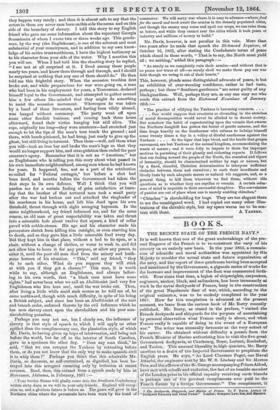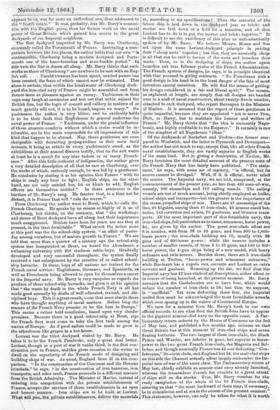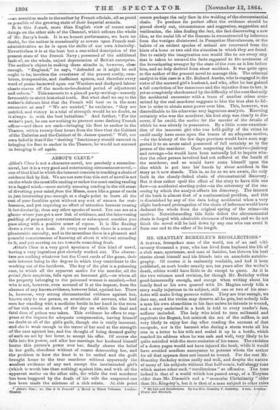BOOKS.
THE RECENT STATE OF THE FRENCH NAVY.*
IT is well known that one of the great undertakings of the pre- sent Emperor of the French is to re-construct the navy of his country on an entirely new basis. In the year 1855, a commis- sion of scientific and naval authorities wee appointed by His Majesty to consider the actual state and future organization of the navy, and the report of these gentlemen having been accepted and sanctioned by the Government, a gigantic series of works for the increase and improvement of the fleet was commenced forth- with. Ever since that time, a legion of shipwrights, carpenters, engineers, anchor, block, and sailmakers, has been incessantly at work in the naval dockyards of France, busy in the construction of the great Napoleonic fleet of war, which, according to the original estimates, was to be entirely completed in the year 1867. How far this completion is advanced at the present moment, we learn from the curious book of Mr. Barry recently published. Mr. Barry, as stated in the preface, " visited the French dockyards and shipyards for the purpose of ascertaining by personal observation what France really is about, and what France really is capable of doing in the event of a European war." The writer was unusually fortunate at the very outset of his career. He obtained without difficulty a permit from the French Minister of Marine authorizing him to visit the five great Government dockyards, at Cherbourg, Brest, Lorient, Rochefort, and Toulon. This unusual liberality in high quarters, Mr. Barry ascribes to a desire of the Imperial Government to propitiate the English press. He says, "As Lord Clarence Paget, our Naval Attaché, the engineers sent by Mr. W. S. Lindsay and Sir Morton Pe to, and the officers of the St. George accompanying Prince Alfred, have met with rebuffs and exclusion, the fact of an humble member of the London press in his official capacity receiving carte blanche is perhaps one of the greatest compliments ever paid to the Fourth Estate by a foreign Government." The compliment, it • The Dockyards, elkipyards, wad Marisa of France. By P. Barry, Author of "Dockyard Economy and Nara Power." London; Sampson Low, Sam, and Maraton.
appears to us, was far more an individual one, than addressed to the "fourth estate." It was, probably, less Mr. Barry's connec- tion with the English press, than his former work on the naval power of Great Britain which gained him access to the great dockyards of our Imperial neighbour.
The first dockyard inspected by Mr. Barry was Cherbourg, commonly called the Portsmouth of France. Instituting a com- parison between the two places, the author holds that our own " is contemptible, Cherbourg being a modern dockyard and Ports- mouth one of the knee-breeches and shoe-buckle period." In this vein the line is drawn all along. Mr. Barry thinks that such works as those of Cherbourg " are nowhere to be met with on Eng- lish soil. . . . Untold treasure has been spent, untried power has been created, the force of which cannot now be estimated. This alone is certain, that within the breakwater of Cherbourg dock- yard the iron-clad navy of France might be assembled and from thence issue at pleasure against an enemy. Yachtsmen in their cups may laugh at casemates and trot out that noble animal the British lion, but the logic of conceit and raillery in matters of so much gravity will not, it is to be hoped, impose on many." On yachtsmen the author is very bitter, and he evidently holds it to be their fault that Englishmen in general underrate the naval power of France. " Yachtsmen, under the genial influence of those creature-comforts without which a cruise would be in- tolerable, are in the main responsible for all impressions of this kind that happen to be abroad. Nay, those gentlemen are even chargeable with detracting propagandism in their more lucid moments, it being an article in every yachtsman's creed, as the exhibitions at their annual dinners testify, that on the salt water at least he is a match for any nine tailors or as many French- men." After this little outburst of indignation, the author gives a very detailed description of all that he saw at Cherbourg, over the works of which, curiously enough, lie was led by a gendarme. He concludes by stating it as his opinion that France " with its ships is ready any hour to fight ; English ships, on the other hand, are not only untried but, let us blush to add, English officers are themselves untried." In these sentences is the burthen of Mr. Barry's song. He fancies that, in a time not far distant, it is France that will " rule the waves." From Cherbourg the author went to Brest, which he calls the French Chatham. He speaks by no means so highly of it as of Cherbourg, but thinks, on the contrary, that " the workshops and stores of Brest dockyard have all along had their importance much exaggerated. Neither have been for years, nor are they at present, in the least formidable." What struck the writer most at this port was the the school-ship system, " an affair of yester- day among ourselves, but of mature growth in France." We are told that more than a quarter of a century ago the school-ship system was inaugurated at Brest, on board the Abondance, a swimming university with 250 studious cabin-boys. Gradually developed and very successful throughout, the system finally received a vast enlargement by the creation of so-called school- ship barracks. In these, boys of all nations are trained for the French naval service : Englishmen, Germans, and Spaniards, as well as Frenchmen being allowed to open for themselves a career in the Imperial navy. Mr. Barry is very sanguine as regards the produce of these school-ship barracks, and gives it as his opinion that "the waste by death in the whole French Navy is all but made good annually by drafts of well educated, trained, and dis- ciplined boys. This is a great result,—one that must startle those who have thought anything of naval matters. Before long the seamen of the French Navy promise to be the best in Europe." This seems a rather bold conclusion, based upon very slender premises. Because there is a good school-ship at Brest, ergo the French fleet must come to take the first rank among the navies of Europe. As if good sailors could be made to grow in the schoolroom like grapes in a hot-house.
Lorient was the third dockyard visited by Mr. Barry. He takes it to be the French Pembroke, only a great deal better. Lorient, though as a port of war it ranks third, is the first con- struction port in France, and this gives occasion to the writer to dwell on the superiority of the French mode of designing and building ships of war. As usual, England fares ill in the com- parison. " In the construction of the Couronne and the Heroine ironclads," he says, "in the construction of iron batteries, iron transports, and other craft, France proceeds in a different manner from the British Admiralty. The Minister of Marine, instead of entering into competition with the private establishments of France, accepts the services of those establishments in an open and honest manner. Iron ships are to be built at Lorient. What will you, the private establishments, deliver the materials
at, according to my specifications ? Thus the material of the future ship is laid down in the dockyard just as bricks and mortar are laid down in a field for a mansion, and all that Lorient has to do is to put the mortar and bricks together." It is difficult to see the excellency of this plan so enthusiastically spoken of by Mr. Barry. We believe Messrs. Moses and Son act upon the same Lorient-dockyard principle in putting their " cheap suits" together ; but that they are nominally cheap is all that can be said in favour of the coats and breeches thus made. Then, as to the designing of ships, the author again launches out into fulsome praise of the French Administration. The French system of designs, he says, is in principle identical with that pursued in giving contracts. "No Frenchman with a good design in his head is in the least danger of the fate of most inventors among ourselves. He will find the means of getting his design considered in a fair and liberal spirit." The means, as explained at length, are simply that all designs are handed over to a stall of naval constructors, about twenty-five in number, attached to each dockyard, who report thereupon to the Minister of Marine. It is assumed that the report of these gentlemen is quite impartial, because they are appointed " not to serve Tom, Dick, or Harry, but to maintain the honour and welfare of France." Mr. Barry thinks that " the idea is eminently Napo- leonic, and highly creditable to the Emperor." It certainly is one of the simplest of all Napoleonic "ideas."
Of the dockyards of Rochefort and Toulon—the former com- pared to Woolwich, and the latter to Plymouth and Devonport-- the author has not much to say, except that, like all other French naval establishments, they are vastly superior to English works of the same kind. But in giving a description of Toulon, Mr. Barry furnishes the most detailed account of the present state of the French Navy that has lately been published. " The state- ment," he says, with some air of mystery, " is official, but its source cannot be divulged." Well, if it is official, never mind the source. The Imperial navy, we are told, comprised, at the commencement of the present year, no less than 400 men-of-war, namely, 380 steamships and 110 sailing vessels. The sailing vessels are not of much account, being chiefly employed as hulks, school-ships, and transports—but the greater is the importance of the steam-propelled ships of war. There are 37 steamships of the line, GO frigates, among them 17 iron-clads, 21 armour-cased bat- teries, 142 corvettes and avisos, 70 gunboats, and 50 screw trans- ports. Of the most important part of this formidable navy, the iron-clad ships, full particulars as to name, armament, horse-power, &c., are given by the author. The great iron-clads afloat are 8 in number, with from 36 to 52 guns, and from 000 to 1,000- horse power ; the iron-clads building are 10, mostly with 86. guns and of 900-horse power ; while the reserve includes a number of smaller vessels, of from 4 to 16 guns, and 150 to 300- horse power, the 4-gun ships being of a new model, with heavy ordnance and twin screws. Besides these, there are 5 iron-clads building at Toulon, "horse-power and armament unknown," while Bordeaux has a cupola ram corvette and Lorient an extra corvette and gunboat. Summing up the list, we find that the Imperial navy has 42 iron-clads of all descriptions, either afloat or in course of being launched, at the present moment. Mr. Barry surmises that the Confederates are to have four, which would) reduce the number of iron-clads to 38; but this, we suppose,. is " unofficial." Yet oven deducting these four, the Imperial mailed fleet must be acknowledged the most formidable armada which ever sprang up in the waters of Continental Europe.
We turn for a moment from Mr. Barry's book to our own. official records, to see what fleet the British Isles have to oppose to the gigantic armour-clad navy on the opposite coast. A Par- liamentary return ordered by the House of Commons on the 3rd of May last, and published a few months ago, informs us that Great Britain has at this moment 27 iron-clad ships and seven, floating batteries. The two largest of these iron-clads, the Blaok Prince and Warrior, are inferior in guns, but superior in horse- power to the two great French iron-clads, the Magenta and Sol- ferino, and though nominally France has 42—or deducting "Con- federates," 38—iron•clads, and England but 34, the mail-clad ships, on this side the Channel actually afloat largely outnumber the Im- perial men-of-war of the same class. The Parliamentary return of May last, chiefly exhibits an armour-clad navy already launched,, whereas the tremendous French list consists to a great exteat of ships still on the stocks. True, Mr. Barry vouches for the ready completion of the whole of the 42 French iron-clads, assuring us that "the most backward of them may, if necessary, be in commission and at sea in the course of the present summer." This statement, however, can only be taken for what it is 'roses
—an assertion made to the author by French officials, all as proud as possible of the growing state of their Imperial armada.
It is this 1% reach, more than English view of recent naval doings on the other side of the Channel, which colours the whole of Mr. Barry's book. It is an honest performance, we have no doubt, for the author is occasionally as severe upon French mal- administration as he is upon the shifts of our own Admiralty. Nevertheless it is at the best but a one-sided description of the present state of the French Navy ; possessed of the additional fault of; on the whole, unjust depreciation of British enterprise. The author's object in making these attacks is, however, clear enough. "England," he says, "defended as it might be and ought to be; involves the overthrow of the present costly, cum- brous, irresponsible, and inefficient system, and therefore every word of praise bestowed upon our Warriors and dockyard labour charts staves off the much-to-be-desired period of adjustment and reform." This amounts to a plea of party-writing—scarcely favourable to strict historical truth. But what shall we say to the author's delicate hint that the French will beat us in the•next encounter at 'sea? " We are untried," he exclaims, " they are untried, and victory in a trial of strength would be no doubt, as it always is. with the best battalions." And further, For the writer's part, lie can see nothing to prevent some dashing French officer—and there are such—bringing his fleet to anchor in the Thames, within twenty-four hours from the time that the Cabinet of the Tuileries and the Cabinet of St. James quarrel." Well, our own belief is that if the " dashing '' functionary should succeed in bringing his fleet to anchor in the Thames, he would not succeed in bringing it off again.
































 Previous page
Previous page